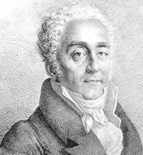François-Auguste Parseval-Grandmaison
François-Auguste Parseval-Grandmaison , occasionally Auguste Parseval de Grand-Maison , (born May 7, 1759 in Paris , † December 7, 1834 ibid) was a French painter and poet .
Life
Parseval-Grandmaison was the younger brother of the mathematician Marc-Antoine Parseval (1755-1836).
Parseval-Grandmaison first studied painting with Jacques-Louis David . After he was ruined during the Revolution , he earned his living as a portrait painter in the horror that followed .
Then he joined Napoléon Bonaparte , in whose honor he wrote various poems. He was a member of the Commission des sciences et des arts , which accompanied Bonaparte on his Egypt campaign in 1798, where he became a member of the Cairo Institute .
As the successor to the writer Ange-François Fariau de Saint-Ange , Parseval-Grandmaison was elected as a member of the Académie française ( Fauteuil 1 ) in 1811 .
At the age of 75, Parseval-Grandmaison died on December 7, 1834 in Paris and found his final resting place in the Père Lachaise cemetery (11th division).
reception
His main work is the two-volume "Philippe-Auguste" (1825; 1826) on which he worked for more than 20 years. He also wrote “Les amours épiques” (1804) and a poem to celebrate Napoleon's marriage and the birth of his son. His epic about the Egyptian expedition was never published.
Works
- Poésies diverse composées en Egypt, en Angleterre et en France. Paris 1803.
- Les Amours épiques, poëme en six chants, contenant la traduction des épisodes sur l'amour composés par les meilleurs poëtes épiques. Dentu, Paris, 1804.
- Philippe-Auguste. Poëme herroïque en douze chants. Édition André, Paris 1826 (2 vol.).
literature
- François-Auguste Parseval-Grandmaison . In: Hans Vollmer (Hrsg.): General lexicon of fine artists from antiquity to the present . Founded by Ulrich Thieme and Felix Becker . tape 26 : Olivier – Pieris . EA Seemann, Leipzig 1932, p. 260 .
Web links
- Literature by and about François-Auguste Parseval-Grandmaison in the catalog of the German National Library
- Short biography and list of works of the Académie française (French)
- Private page on François-Auguste Parseval-Grandmaison (French)
| personal data | |
|---|---|
| SURNAME | Parseval-Grandmaison, François-Auguste |
| ALTERNATIVE NAMES | Parseval-Grandmaison, François Auguste; Parseval-Grandmaison, François A .; Parseval de Grand-Maison, Auguste (AKL) |
| BRIEF DESCRIPTION | French author |
| DATE OF BIRTH | May 7, 1759 |
| PLACE OF BIRTH | Paris |
| DATE OF DEATH | December 7, 1834 |
| Place of death | Paris |
